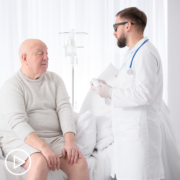When Should Prostate Cancer Patients Consider a Clinical Trial?
When Should Prostate Cancer Patients Consider a Clinical Trial? from Patient Empowerment Network on Vimeo.
Prostate cancer clinical trials can advance research and expand treatment options, but where does participation fit into a treatment plan? Expert Dr. Rana McKay explains the benefits of joining clinical trials, common misconceptions, clinical trial phases, monitoring, and key questions to ask your healthcare team.
Dr. Rana McKay is an associate clinical professor of medicine at Moores Cancer Center at UC San Diego Health. Learn more about Dr. McKay.
See More from Evolve Prostate Cancer
Related Resources:

Understanding Prostate Cancer Treatment Options and Care Goals |

|

Overcoming Barriers | Advice for Accessing Prostate Cancer Clinical Trials |
Transcript:
Katherine:
But progress can only be made with patient participation in clinical trials, as we know. So, when should a patient consider participating in a trial?
Dr. McKay:
Thank you so much for bringing this point up. I think our clinical research is critically important to advancing the field. Clinical trials, I think, are really – they offer our patients the treatments of tomorrow today, quite honestly. And I think the way trials are designed, they’re designed to test different treatment modalities, test in reference to the standard of care. I think at any point in time, anybody can think about enrolling on a clinical trial. I think sometimes there’s this false notion that, “I’m not going to enroll in a trial until later on, until I’ve failed all different kinds of treatments.” That’s not true.
I think at any juncture along the way where a decision is being made around initiating a systemic therapy, or proceeding with a surgical intervention, or radiation intervention it’s always worthwhile to stop and ask, “Are there any clinical trials that I could be eligible for right now? And if so, what are they? So, I think it’s really important, I think, for patients to know that and to ask of their clinicians that are caring for them, “Are there any clinical trials?”
And it may be that patients, not to say, may need to travel, but if they’re not necessarily at that institution where somebody may be receiving their care with a clinician asking their doctor, “Are there other trials at places close by where I can go and explore?” I think that’s a really important thing.
Katherine:
What about common misconceptions? What are you hearing from patients about their fears and hesitations about participating in the trial?
Dr. McKay:
Yeah. I think a lot of patients have a fear of, “I don’t want to be a hamster or a guinea pig. I don’t want to get placebo. I don’t want to get suboptimal care.” So, I think, to step back, I think the clinical trials are designed where actually patients are followed very, very closely, probably even more closely than I think would be in general with laboratory tests, PSA testing, imaging, at critical time points to assess that any therapies or strategies is working. Many trials are not necessarily placebo-controlled trials.
Placebo-controlled trials are really only utilized in the context when somebody may – where the standard of care is to either do nothing or do one drug alone, not two drugs, and then, somebody’s getting one drug and getting a placebo. So, the placebo-controlled trials are really, first off, they’re later-staged studies, they’re usually Phase III studies, or large Phase II studies that have gotten pretty far on the runway of clinical trial and clinical drug development.
And it’s in the context of, you know, “Well, if I didn’t do the clinical trials, I’m probably not going to do anything,” or I’m not going to – you know, “If I decided to not do the trial, I would get no treatment, but if I’m doing the trial, there’s a 50 percent chance I’ll get no treatment and 50 percent chance I may get something. So, we have to think about, “Well, what is the standard of care?” and the standard of care matters because that is what it’s being compared to. If the clinical situation is that the standard of care is to monitor, then that’s where a placebo may be utilized.
But if a standard of care is that somebody should get treatment with X drug, then that X drug would be in the controlled arm of the study.
Katherine:
Yeah.
Dr. McKay:
But not every trial has a placebo.
Katherine:
What would you say to someone who is nervous or hesitant about participating in a trial?
Dr. McKay:
Yeah. Very good question, I think. Talk to your clinician. Talk to your doctors about those fears. What are the reservations? What are the concerns? Sometimes, I think the unknown is always – the fear of the unknown kind of causes a lot of angst. But when people are on a clinical trial, when you’re on a clinical trial, you are in control. Some people don’t believe that, but you are, at any point in time, you can decide to stop. You don’t even need to have a reason for why you decide to stop. At any point in time, if something is not working for you, you have choice.
And so, I think that is something that is really important for patients to know that you’re actually in control, you’re being watched very closely, being watched very carefully for safety toxicity. If there’s a toxicity, people are not going to – you’re not going to just stay getting the same regiment in the exact same way if you’re not tolerating it. If something isn’t working, you’re not going to continue receiving the therapy that’s no longer working just because you’re on a clinical trial.
Katherine:
Right.
Dr. McKay:
And you’re in control; at any point in time, you could say, “I don’t want to participate anymore.”










